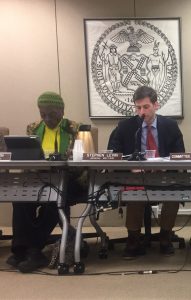By María Venegas
On Thursday, New York City Councilmembers discussed problems related to food insecurity among low-income New Yorkers, especially students.
The Committee on General Welfare, chaired by Council Member Stephen Levin, together with the Committee on Higher Education, chaired by Council Member Inez Barron, conducted the oversight hearing to examine the issue of hunger in New York City.
Representatives from the Human Resources Administration (HRA), the Mayor’s Office of Food Policy, the City University of New York (CUNY), as well as anti-hunger and higher education advocates, emergency food providers and other interested parties had been invited to testify.

Chloë Rivera, a policy analyst with the Committee on Higher Education, said, “Students should not have to choose between paying for a bill and buying food. It’s heart wrenching to talk to a student who has not eaten in days because he had to use his money for transportation, or other household expenses that he considered more urgent than having a meal.”
The latest New York City reports indicate that 43.5 percent of NYC residents were living at or near poverty in 2016.
Food pantries have been put in place at different locations throughout the city, which have helped those who do not qualify to receive SNAP benefits. (SNAP is the U.S. Supplemental Nutrition Assistance Program.)
The City University of New York has also implemented food programs for students who are at risk of dropping out because of their financial situation.
“Hunger decreases your levels of concentration, it causes headaches, and general fatigue, and students that are in this predicament, tend to perform at lower levels than student who are food-secured,” said Jessica Chait, managing director for food programs at the Metropolitan Council on Jewish Poverty.
City officials have said that the stigma associated with getting free meals should not prevent needy students from receiving assistance. To avoid the embarrassment that this situation may cause, city officials have proposed the use of vending machines, which students can use to purchase food items with a card.
The City University of New York has implemented programs to help low-income students to get food to take home. CUNY has done so at different colleges, such as John Jay and the Borough of Manhattan Community College.
“But a lot more is still to be done,” said Councilmember Stephen Levin.

Leave a Reply
You must be logged in to post a comment.